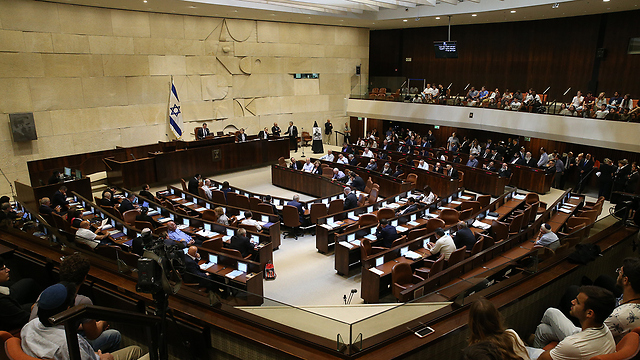
Knesset
צילום: עמית שאבי
New law seeks to bar gov't ministers from holding Knesset seats
MKs David Bitan (Likud) and Yoel Hasson (Zionist Union) propose legislation meant to increase legislative effectiveness and enact a clear separation of powers.
A new bill prohibiting serving government ministers from simultaneously being Knesset members has been submitted by coalition chairman MK David Bitan (Likud) and MK Yoel Hasson (Zionist Union).
Under the proposal, following the next round of elections, ministers who are also Knesset members will be required to give up their seats to the next candidate on their party's list.
Currently, nearly a quarter of Knesset members also serve as government ministers, which many claim violates the principle of separation of powers and makes it difficult for the Knesset to function.
This is due to the fact that as a result of their dual roles as ministers and Knesset members, many neglect their roles as MKs and do not fulfill obligations, such as taking part in various committees. By extension, this situation puts more pressure on other MKs to fill the void.
Two years ago, the Knesset passed the "Mini-Norwegian Law," which dictated that a minister or deputy minister may resign from his or her position as MK, while still remaining a minister or deputy minister. Their seat in the Knesset would in turn be filled by the next candidate from their party's list. Examples of this arrangement include Minister of Defense Avigdor Lieberman and Finance Minister Moshe Kahlon.
The new "Giant Norwegian Law" would require all 19 ministers to resign from the Knesset. The law would also not allow ministers to return to the Knesset if they are still serving as a minister. Additionally, the law would not apply to the prime minister, the deputy prime minister or any minister without portfolio.
While the new law is expected to be costly, others believe it will significantly increase the effectiveness of the Knesset. For example, the Israel Democracy Institute supports the law, believing that it will reduce conflicts of interest between the legislative branch and the executive branch.
"The law is extremely necessary," said Bitan. "I see that there aren't Knesset members every day to fulfill their parliamentary responsibilities on committees or the plenum."
Hasson added, "The time has come for Israel to have a real separation of powers. 30 spots in the Knesset are occupied by government ministers, who in practice, don't even function as Knesset members. This fact severely impairs the status of the Knesset and its ability to function effectively. At the end of the day, a strong Knesset makes for a strong public."













